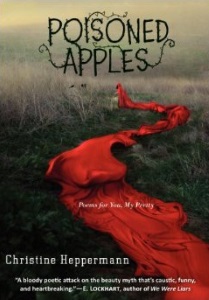2018 School Spending Survey Report
Transformers: What Fairy Tales Tell
I don’t retell fairy tales.
 I don’t retell fairy tales. They retell me. Over and over again they tell me who I am, how I feel, what I believe.
I don’t retell fairy tales. They retell me. Over and over again they tell me who I am, how I feel, what I believe.This process of self-discovery happens every time I write a poem, but it seems to happen most acutely when I throw on Red Riding Hood’s cloak or pull up a chair to confront the Wicked Queen’s veracious mirror. Adopting a fairy-tale persona gives me permission to venture into the dark alleys of my mind that I would otherwise avoid. I’m undercover — it’s not me breaking all those rules! Except it is. In the tower and the castle and the cottage, I’m always there.
In Once Upon a Time: A Short History of the Fairy Tale, folklore scholar Marina Warner — one of my idols — explains the seemingly paradoxical power of these fantastical stories to help us deal with reality. “The structures of wonder and magic open ways of recording experience while imagining a time when suffering will be over. Fate will be changed; perpetrators overcome. The wishful thinking and the happy ending are rooted in sheer misery.” Normally we call something a fairy tale when we think it seems too good to be true, but, as Warner suggests, the term could easily mean the opposite. Bad things happen to fairy-tale characters. Very bad things. They hardly ever reach the heights of happily-ever-after without first clawing their way up from hunger, abandonment, abuse, and despair.
Writing the fairy tale–based poems in my collection Poisoned Apples: Poems for You, My Pretty helped me make sense of the ugliness around and inside of me without losing hope. I plunged into the wolf’s belly and eventually emerged feeling…what? Not unscathed. Not triumphant. Not like I have all the answers. More like I’m glad I asked the questions and like I might just have the courage to keep asking.
From the May/June 2015 special issue of The Horn Book Magazine: Transformations.
RECOMMENDED
ALREADY A SUBSCRIBER? LOG IN
We are currently offering this content for free. Sign up now to activate your personal profile, where you can save articles for future viewing.




Add Comment :-
Be the first reader to comment.
Comment Policy:
Comment should not be empty !!!